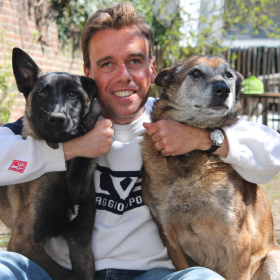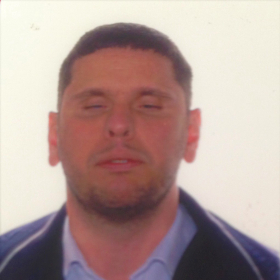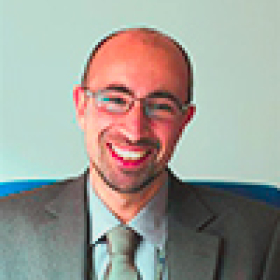
Meet EU Staff

Below you can find testimonials from current staff working in the EU institutions, focusing on diversity and inclusion aspects. These testimonials are an opportunity for you to learn more about the personal and professional experiences of EU staff.

Frederic, in charge of accessibility for people with reduced mobility at the OIB
Frederic is in charge of accessibility for people with reduced mobility at the OIB (the European Commission's office for infrastructure and logistics). Frederic is blind and has been working for the EU institutions since 1998.
We asked him what kind of special arrangements were provided to him at his job.
"Computer equipped with speech synthesis software (JAWS), Braille keyboard. When I arrived, DG Research & Innovation offered me more than what I really needed, it was very impressive and great as a welcome. My first experience was great. Afterwards, during my mobility it was less obvious, but I always knew how to have what I needed by being patient."
Frederic also shares that his disability is not an obstacle within his team.
"The handicap is an advantage here! I present it in a joyful way. I do not give the impression of dragging all the misery of the world behind me. And because I have a dog, it helps, it is the mascot."

Maurizio, Press Officer
Maurizio is press officer in the European Parliament in Italy. He is blind and has been working for the EU institutions since 2015.
We asked him how he found the selection procedure and if he feels integrated in his team.
"The EPSO Accessibility Team was great! Everything went very well during the competition. I had my test in Brail and a personal assistant; I also had a test in an electronic version. In terms of proper job selection, it was only the interview so I didn’t really need any accommodation. I don’t feel any obstacles. I never had problems because I was disabled. If you have a positive attitude, even if people are ignorant or sceptical, if you’re keen on sharing your experience, you can break walls."
Maurizio advises other candidates with special needs to apply for an EU Career.
"I would say, it is absolutely feasible, it can be done, and you don’t need to be polyglot or a super hero! It’s just something very feasible. It takes so little of your time, that you don’t have anything to lose, and what you have to win is a very interesting career. Cost benefit analysis is definitely interesting. The only thing painful thing is the application…. But once you’ve done with it, it’s very little time and potentially a huge opportunity! Don’t be discouraged by the application!"

Krystle, Communications Assistant
Krystle works as a communications assistant in the European Commission in Brussels, she has reduced mobility and has been working for the European institution since 2002.
We asked her what kind of special arrangements were provided to her and if she feels her disability has been an obstacle for her job.
"The Commission provided me with a wheelchair, a footrest, a medical chair and a reserved parking space. Support bars were placed in the washroom. I feel totally integrated in my team. When we have a meeting, my colleagues come spontaneously to offer help to take me or ask what they can do. It is a pleasure to feel appreciated and recognized for my work. I do not have any special treatment, I work as hard as the others, under a benevolent look when it comes to mobility."
Krystle also gives her advice to other candidates with special needs applying for an EU Career.
"I highly recommend applying! No physical handicap is an obstacle, competitions are based on knowledge, not a marathon. Everyone is accepted, nationality, color, gender, physical disability, ... nothing is an obstacle. All EU nationalities from all horizons are represented, the difference is positive. Maltese PRM or Estonian visually impaired, it has no importance. Multicultural means working with others, without making any distinctions. The Institutions have set up services that welcome all types of people, equal opportunities are a real right."

Fabio, Head of unit
Fabio is a head of unit at the European Parliament's Directorate of Human Resources. He is a leg amputee and has been working for the European institutions since 2001.
We asked him if he needed any kind of special arrangements at his job.
"When I can not walk with my prosthesis I walk on crutches, but cannot use my hands. I do not use anything special, I have IT tools (Ipad, fewer notebooks). For my back problems due to the prosthesis, I have a table adjusted in height. I am entitled to parking. It was not difficult to get the amenities. Since I have a motor disability, it is less problematic. I can interact 100%."
Fabio shares his advice for other candidates with special needs applying for an EU Career.
"We must not be afraid, we must give ourselves the means to face a new situation. Do not go in the dark, come here and think that everything will be fine and that the Parliament will take care of everything. No institution in the world will be able to take care of everything. Preparing for a new environment is especially applicable for people with disabilities. Someone with a disability already knows that they have to approach things differently... prepare themselves differently too."

Aleks, Financial Officer
“Hello, my name is Aleks (she/her), and I work as a Financial Officer at the European Commission’s Directorate-General for Budget (DG BUDG). My main responsibilities are in the areas of EU Green Bond financing and Asset Management Coordination. I’m also a member of the Commission’s Task Force on Equality.
Colleagues in my unit, including the Head of Unit, who were the first to be aware of my gender identity, were very supportive and understanding of my transition. Eventually, when the whole directorate became aware of my identity, I can confidently say that I have not had a single bad experience but rather found support and ‘kind curiosity’. I also prepared some materials on transgender issues with senior management, an initiative that was very well accepted by all. Transgender people can find a safe working environment in DG BUDG. Challenges remain, of course, especially when it comes to recognition and digital administrative systems, but positive changes are coming and I am happy to see and be part of various internal task forces and groups working on how to further improve current systems.
There’s a long path ahead but we are on the right course. I believe transgender people will be warmly welcomed in any team in the Commission.”

Ville, Legal Officer
Ville is a legal officer at the European Commission in Brussels since 2013 and has been blind since birth. We asked him how he found the selection process and how he feels at his job in the European Commission.
"I found the service of the Accessibility Team very competent and well-organised. Having received my registration, they came up with suggested arrangements to enable my participation in the first round of the competition on an equal footing as a blind candidate and I found these very appropriate and fit for purpose. This good cooperation from their part continued throughout the competition, including the Assessment Centre phase. For me, a very positive surprise was that almost all documents are in a digital form since all correspondence sent and received is registered in electronic databases. Therefore, as a screen reader user, I spend practically no time scanning paper documents to the computer as I had to do in my previous jobs. I feel fully integrated thanks to the wonderful attitude of my colleagues and superiors."
Ville also gives his advice to other candidates with special needs applying for an EU Career.
"Show your motivation. If you have a disability, try to think about this from the employer's point of view. Be prepared for questions on this subject and think in advance about reasonable solutions to any special needs this might cause in the specific job context. Remain patient. Take each application and interview as a learning opportunity even if you were not chosen. Concentrate on competencies rather than the special needs themselves."
